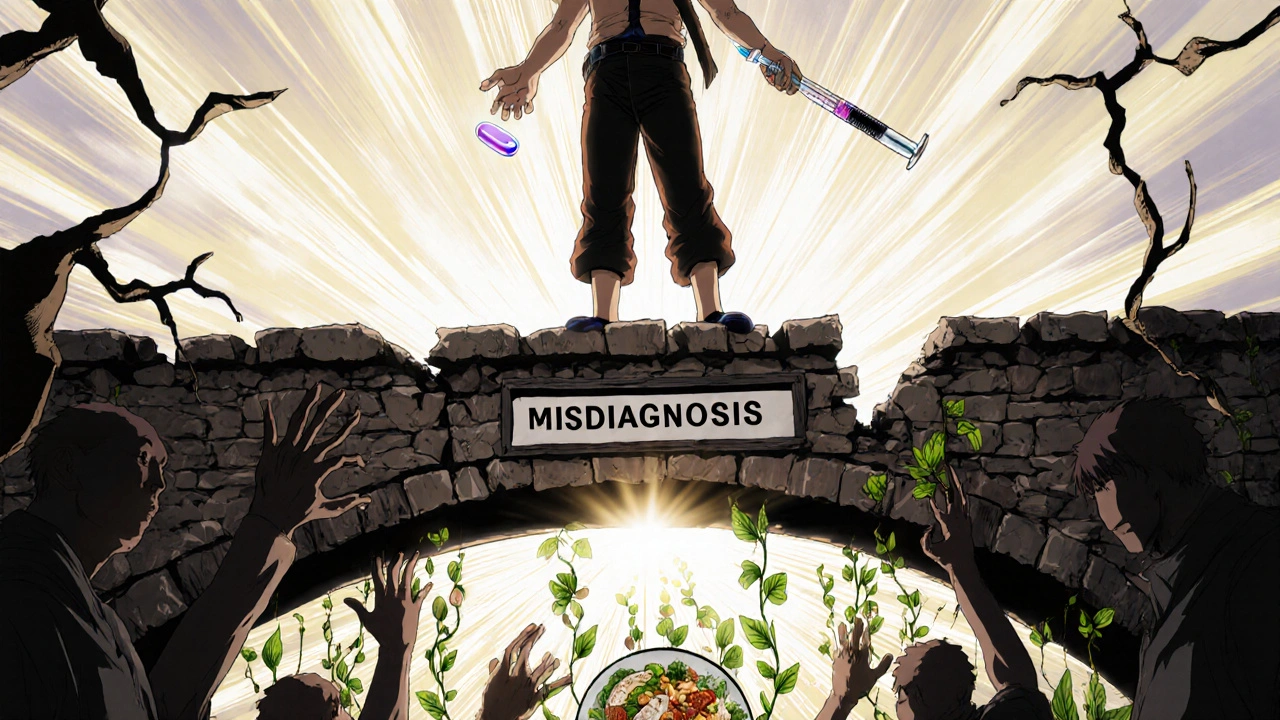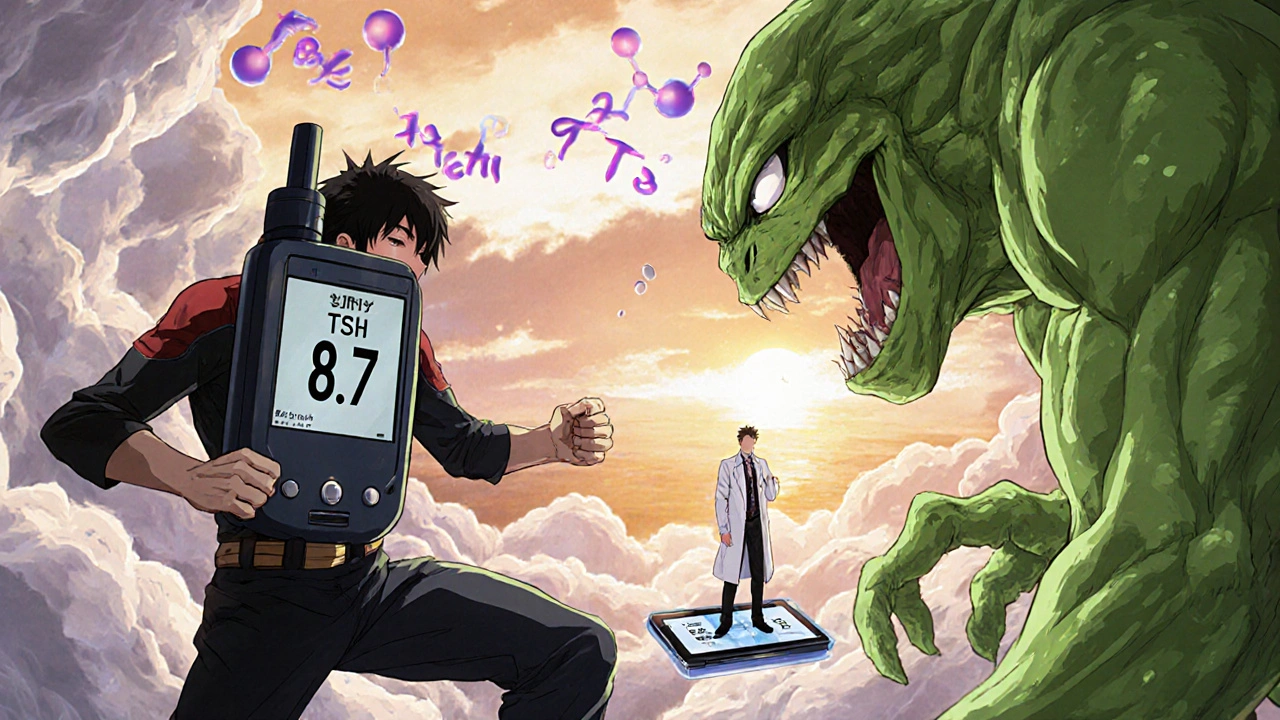
When you’re managing diabetes and start feeling unusually tired, losing hair, or gaining weight without changing your diet, it’s easy to blame it on your blood sugar. But what if the real culprit is your thyroid? The truth is, diabetes and thyroid disease don’t just happen side by side-they actively mess with each other. Up to 30% of people with diabetes also have thyroid problems, and nearly 15% of those with thyroid disease develop diabetes. These aren’t random coincidences. They’re linked by biology, immune system glitches, and shared symptoms that can trick even experienced doctors.
Why Your Thyroid and Blood Sugar Are Connected
Your thyroid doesn’t just control your metabolism-it directly affects how your body uses insulin and processes glucose. When your thyroid is underactive (hypothyroidism), your body slows down. Glucose metabolism drops by 25-30%, meaning sugar stays in your blood longer. That raises your HbA1c, even if you’re eating right and taking your insulin. On the flip side, an overactive thyroid (hyperthyroidism) speeds everything up. Your liver releases glucose faster, your muscles burn through sugar quicker, and your body clears insulin 20-25% faster. That can lead to wild blood sugar swings-highs one minute, lows the next. People with Type 1 diabetes are 5 to 10 times more likely to develop thyroid disease than the general population. Why? Because both are autoimmune. Your immune system attacks your pancreas in Type 1 diabetes, and in Hashimoto’s or Graves’ disease, it attacks your thyroid. Same faulty switch, different target. Even Type 2 diabetes isn’t safe-insulin resistance and chronic inflammation create a perfect storm for thyroid dysfunction.Symptoms That Look Like Diabetes-But Aren’t
Fatigue, weight gain, dry skin, hair loss, and mood swings are common in both diabetes and thyroid disease. That’s why so many patients get misdiagnosed. One patient on DiabetesDaily.com thought her rising blood sugar was due to insulin resistance. Turns out, her TSH was at 8.7 mIU/L-far above the normal range. Once she started thyroid medication, her insulin needs dropped by 30%. Within a week, she had three hypoglycemic episodes because her dose hadn’t been adjusted. Here’s what to watch for when both conditions might be at play:- Unexplained weight changes-gain with hypothyroidism, loss with hyperthyroidism (65-70% of coexisting cases)
- Extreme fatigue-not just from high blood sugar, but from low thyroid hormone
- Muscle cramps or weakness-especially in calves or thighs (33% of cases)
- Hoarse voice-a subtle sign of thyroid enlargement or nerve pressure
- Poor memory or brain fog-45% of patients report this, often mistaken for diabetic neuropathy
- Temperature intolerance-feeling cold when others are warm (hypothyroidism) or sweating excessively (hyperthyroidism)
How Thyroid Problems Make Diabetes Harder to Control
If your thyroid isn’t working right, your diabetes treatment plan falls apart. Hypothyroidism increases LDL cholesterol by 18-22 mg/dL and triglycerides by 25-30 mg/dL. That means your heart is under more stress, and your risk of heart disease spikes. It also makes insulin resistance worse, forcing you to take more insulin or higher doses of oral meds. Hyperthyroidism does the opposite. It burns through insulin faster, so you might need up to 30% more insulin just to keep your numbers stable. But if your thyroid gets treated and slows down, your insulin needs drop suddenly. If your doctor doesn’t adjust your dose, you’re at risk for dangerous lows. Studies show diabetic patients with untreated hypothyroidism have a 37.2% higher chance of developing diabetic retinopathy. That’s not a small risk-it’s a major driver of vision loss. And here’s something most people don’t know: if you have gastroparesis (a nerve complication from diabetes), your body absorbs thyroid medication like levothyroxine 15-20% less effectively. So even if you’re taking your pill, it’s not working like it should.
What You Should Be Testing-and How Often
The American Diabetes Association recommends annual TSH testing for all Type 1 diabetes patients and those with Type 2 who have risk factors: family history of thyroid disease, female gender, age over 60, or presence of other autoimmune conditions. But that’s the bare minimum. If you’ve already been diagnosed with thyroid disease, testing every 3 months is standard. Don’t just check TSH. Ask for:- Free T4 and Free T3-to see actual hormone levels
- Thyroid antibodies (TPO and TgAb)-to confirm if it’s autoimmune
- Comprehensive lipid panel-because thyroid dysfunction messes with cholesterol
Diet and Lifestyle: What Actually Works
Medication alone won’t fix this. You need a plan that supports both your thyroid and your blood sugar. The Mediterranean diet keeps coming up in research-not because it’s trendy, but because it works. A 6-month trial showed it lowered HbA1c by 0.8-1.2% and TSH by 0.5-0.7 mIU/L. That’s as effective as some medications. Focus on:- Whole foods: vegetables, legumes, nuts, olive oil, fatty fish
- Enough iodine-but not too much. Seafood and eggs are safe. Avoid kelp supplements unless your doctor says so.
- Timing meals to match your energy. If you’re hypothyroid, eating smaller, more frequent meals helps stabilize blood sugar.
- Managing stress. Cortisol messes with both thyroid and insulin. Even 10 minutes of daily breathing exercises can help.
Medication Pitfalls and How to Avoid Them
Thyroid meds like levothyroxine need to be taken on an empty stomach, usually 30-60 minutes before breakfast. But if you have gastroparesis from diabetes, your stomach empties slowly. That means the pill sits there, absorbing poorly. Solution? Take it at bedtime instead-after your last meal, at least 3 hours later. Also, watch for interactions. Calcium, iron, and even coffee can block absorption. Take thyroid meds at least 4 hours apart from these. And never assume your insulin dose is “set.” If your thyroid changes, your insulin needs will too. Keep a log: note your TSH levels, how you feel, your insulin doses, and your average glucose. Bring it to every appointment.
What Happens When You Get It Right
When both conditions are managed together, the results are dramatic. Patients see fewer hospital visits, fewer emergency trips, and better long-term outcomes. One study showed a 22% drop in hospitalizations and a 17% drop in ER visits once thyroid levels were stabilized. New research is even more promising. A 2024 pilot study found that GLP-1 receptor agonists-drugs like semaglutide used for diabetes-actually improved thyroid function in 63% of patients with subclinical hypothyroidism. That’s not just a side effect. It might be a game-changer. The big takeaway? Treating diabetes without checking your thyroid is like fixing one leak in a flooded house while ignoring the broken pipe upstairs. You’ll keep mopping the floor, but the water keeps coming.Frequently Asked Questions
Can thyroid problems cause high blood sugar even if I’m not diabetic?
Yes. Hypothyroidism slows down how your body processes glucose, which can lead to insulin resistance and elevated blood sugar-even in people without diabetes. Studies show up to 21.9% of people with thyroid dysfunction develop Type 2 diabetes. If you have unexplained high blood sugar and fatigue, checking your thyroid is essential.
Should I get my thyroid tested if I have Type 2 diabetes?
Absolutely. While annual TSH screening is recommended for Type 1 diabetics, the American Diabetes Association also advises testing for Type 2 patients who are over 60, have a family history of thyroid disease, are female, or have other autoimmune conditions. Many cases go undiagnosed because symptoms are blamed on diabetes itself.
Can thyroid medication lower my insulin needs?
Yes, especially if you have hypothyroidism. When your thyroid function improves, your body becomes more sensitive to insulin. Some patients see insulin requirements drop by 20-30% after starting levothyroxine. That’s why adjusting your insulin dose after thyroid treatment is critical to avoid dangerous low blood sugar.
Why do I feel worse after starting thyroid medication?
If you’re diabetic and start thyroid treatment, your body’s metabolism speeds up. That can cause your blood sugar to drop faster, leading to hypoglycemia. You might feel shaky, sweaty, or dizzy-not because the thyroid med is bad, but because your insulin dose is now too high. Talk to your doctor about adjusting your diabetes meds within 2-4 weeks of starting thyroid treatment.
Is there a link between thyroid disease and diabetic complications?
Yes. Untreated hypothyroidism increases the risk of diabetic retinopathy by nearly 40%, worsens nerve damage, and raises cholesterol levels significantly. Hyperthyroidism can speed up kidney damage and increase heart strain. Managing your thyroid isn’t optional-it’s a key part of preventing long-term diabetes complications.
What to Do Next
If you have diabetes and suspect thyroid issues, don’t wait for your next checkup. Request a full thyroid panel: TSH, free T4, free T3, and thyroid antibodies. If you already have thyroid disease, ask your doctor if your insulin or oral diabetes meds need adjusting. Keep a symptom journal: note energy levels, weight changes, blood sugar patterns, and mood. Bring it to your appointments. The connection between your thyroid and your blood sugar isn’t theoretical-it’s measurable, treatable, and life-changing. Getting both under control doesn’t just improve your numbers. It gives you back your energy, your focus, and your peace of mind.Write a comment
Your email address will not be published.





10 Comments
As someone who's managed both T1D and Hashimoto's for over a decade, I can tell you the thyroid-diabetes feedback loop is real. The fatigue isn't just hyperglycemia-it's low T3 conversion. The weight gain? Not insulin resistance alone, it's reduced mitochondrial efficiency from low thyroid hormone. I had to push my endo for free T3 and TPO antibodies because TSH alone was misleading. Once I got my levothyroxine optimized, my basal insulin dropped 25%. No magic, just biology.
And yes-gastroparesis ruins levothyroxine absorption. I switched to bedtime dosing after my GI doc confirmed delayed gastric emptying via gastric emptying scan. Game changer.
Also, avoid selenium supplements unless you're deficient. Too much can trigger thyroid flares in autoimmune patients. Stick to food sources: Brazil nuts (1-2/day), tuna, eggs.
Don't let anyone tell you 'it's all in your head' when your labs don't match your symptoms. Trust the data, not the assumptions.
Oh my goodness, this is the most comprehensive, beautifully articulated piece on the thyroid-diabetes nexus I’ve ever read. I’m not even diabetic but I work in endocrinology and I’m practically weeping at how clear this is. The way you’ve laid out the metabolic interplay-especially the insulin clearance rates with hyperthyroidism-is textbook-level brilliance. I’ve seen patients misdiagnosed for YEARS because their GP thought ‘fatigue = poor diabetes control’. This should be required reading for every GP in the NHS and beyond. Bravo. Absolutely brilliant.
Thank you for writing this. I am a Type 2 diabetic with Hashimoto’s, and I have been fighting for years to get my doctors to test my T3 and T4. They always said, ‘Your TSH is normal, so you’re fine.’ But my TSH was 4.8, and my free T4 was 0.8, and I was exhausted, gaining weight, and my HbA1c kept rising. When I finally found a functional medicine doctor who ordered the full panel, everything changed. I started on levothyroxine, adjusted my carbs, and my HbA1c dropped from 7.8 to 6.1 in six months. Please, if you have diabetes and feel off, ask for Free T4, Free T3, and TPO antibodies. Don’t settle for TSH alone. Your life depends on it.
This is essential info. If you have diabetes and unexplained symptoms, get your thyroid checked. Period.
ok so i just found out my tsh was 9.2 last month and i’ve been blaming my high bgs on stress and carbs but wow this makes so much sense now. i’ve been so tired and my hair’s been falling out and i thought it was just diabetes getting worse. i’m gonna call my doc tomorrow and ask for the full panel. also i take my thyroid med with coffee bc i’m lazy but now i’m terrified. i’m gonna start taking it at bedtime like you said. thanks for this.
Let me cut through the noise: if you’re diabetic and your numbers aren’t improving despite perfect carb counting and insulin timing, your thyroid is probably the missing variable. This isn’t fringe medicine-it’s evidence-based physiology. Hypothyroidism doesn’t just ‘contribute’ to poor glycemic control-it actively sabotages it. Your liver isn’t releasing glucose properly, your muscles aren’t taking it up, your insulin sensitivity is down, and your body’s clearing meds slower. Meanwhile, hyperthyroidism turns your glucose into a rollercoaster. And yes, gastroparesis ruins levothyroxine absorption-so bedtime dosing isn’t a hack, it’s a clinical necessity. I’ve seen patients go from HbA1c 9.5 to 6.8 in 12 weeks after fixing their thyroid. This isn’t anecdotal. It’s reproducible. Stop treating diabetes in a vacuum. Your thyroid isn’t a side note-it’s a co-pilot. And if you’re not checking it, you’re flying blind.
My endo never tested my thyroid until I had a hypoglycemic seizure. Turns out my TSH was 11. I was on 40 units of insulin a day. After starting levo, I dropped to 28. Three weeks later I had two lows in one day because no one adjusted my dose. I had to learn this the hard way. If you’re on insulin and your thyroid meds change, call your doctor. Don’t wait. Your next low could be your last.
THIS. I’ve been saying this for years. I have T1D and Hashimoto’s. My biggest tip? Track your energy levels alongside your glucose. When my T3 drops, my CGM shows weird patterns-even with no carb changes. I started a simple journal: energy (1-10), TSH, insulin dose, average glucose. It took me 3 months to see the correlation. Now my doctor listens. Also, if you’re on GLP-1s, they might actually help your thyroid too. Wild, right? 🤯
I appreciate how detailed this is. I’ve had both conditions for 12 years. I didn’t realize my brain fog was linked to low T3 until I got tested. I thought it was just diabetic neuropathy. Turns out, it was both. Now I take my levothyroxine at bedtime, avoid calcium supplements within 4 hours, and eat more selenium-rich foods. Small changes, huge difference. Thanks for sharing the science. It helps when you feel like you’re alone in this.
As a Nigerian endocrinologist with over 15 years of experience, I can confirm this is not just a Western phenomenon. In our clinic, over 28% of Type 2 diabetic patients had undiagnosed thyroid dysfunction. Many assumed fatigue was from poor diet or lack of exercise. We now screen all diabetic patients over 40 for TSH and TPO antibodies routinely. The cost of screening is negligible compared to the cost of untreated complications-retinopathy, neuropathy, cardiovascular events. This article is accurate, timely, and vital. I will be sharing it with my colleagues and patients.